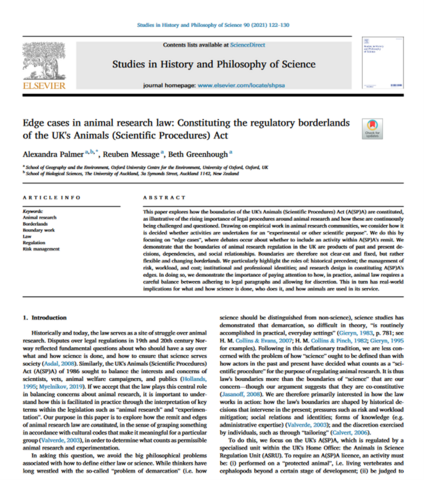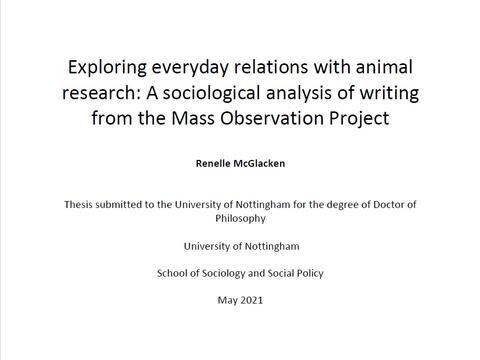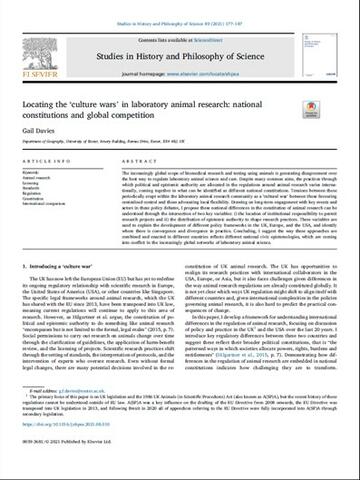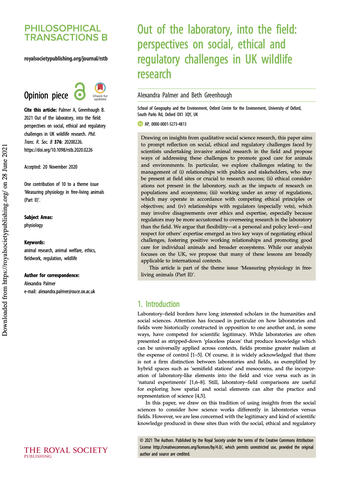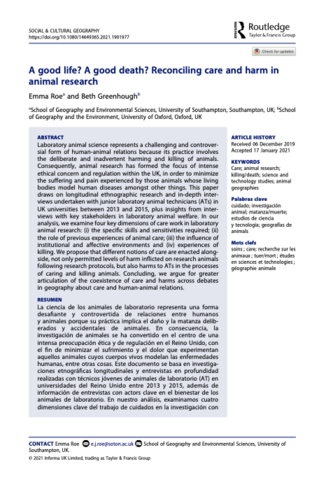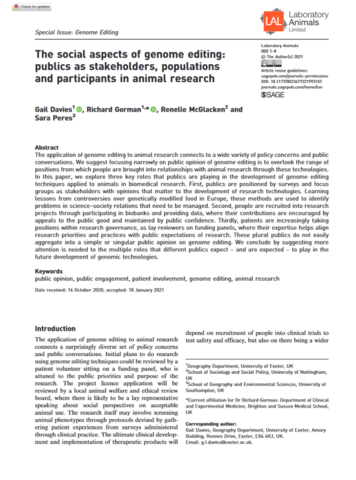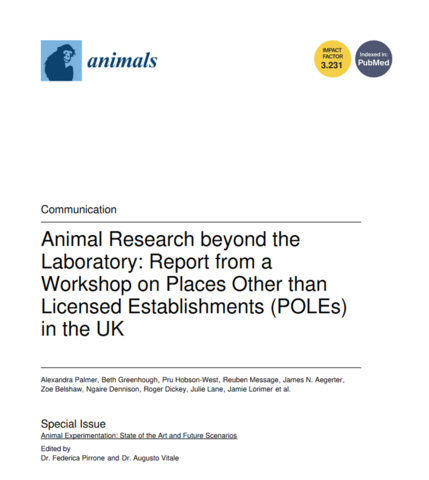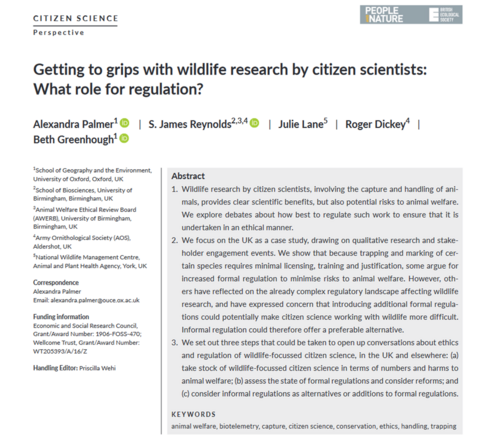Publications: Papers
Animal research remains a practice marked by controversy and moral dilemma. However, UK science-society dialogues on the issue are increasingly managed via one-way transmissions of information which construct publics as passive and attribute their concerns to a lack of ‘correct’ knowledge. Challenging such assumptions, this paper questions how and why people actively manage their interactions with animal research through entangled practices of knowing and caring. Based on an analysis of writing from the UK Mass Observation Project, this paper explores difficulties and discomforts associated with animal research which can cause strategic withdrawals from engagements with the topic. In doing so, it extends existing concepts of ‘uncomfortable knowledge’ (Rayner) and ‘strategic ignorance’ (McGoey) to develop novel concepts of ‘uncomfortable’ and ‘strategic’ care. Finally, in examining desires to respond to animal research, I engage with Haraway’s notion of ‘response-ability’ to introduce the concepts of ‘responsive caring’ and ‘responsive knowing’.
Historically and today, the law serves as a site of struggle over animal research. The UK's Animals (Scientific Procedures) Act (A(SP)A) of 1986 sought to balance the interests and concerns of scientists, vets, animal welfare campaigners, and publics. If we accept that the law plays this central role in balancing concerns about animal research, it is important to understand how this is facilitated in practice through the interpretation of key terms within the legislation such as “animal research” and “experimentation”. Our purpose in this paper is to explore how the remit and edges of animal research law are constituted, in the sense of grasping something in accordance with cultural codes that make it meaningful for a particular group, in order to determine what counts as permissible animal research and experimentation.
This thesis explores how the topic of laboratory animal research is related to in everyday life in the UK, providing a sociological analysis of practices of knowing, caring, and constructing necessary biomedical uses of animals. In doing so, it develops the few qualitative studies of societal understandings of animal research, aiming to expand analyses in this area beyond measurement of polarised and static notions of acceptance or opposition. Instead, this thesis approaches understandings of animal research as relational and positional, emerging within particular yet shared social worlds which give the issue meaning in the everyday.
The increasingly global scope of biomedical research and testing using animals is generating disagreement over the best way to regulate laboratory animal science and care. Despite many common aims, the practices through which political and epistemic authority are allocated in the regulations around animal research varies internationally. This article proposes a framework for understanding and thinking across national differences in the regulation of animal research.
In this new paper published in the Vet Record journal, Alistair Anderson and Pru Hobson-West report findings from the project which focuses on the role of the UK Named Veterinary Surgeon. The article focuses on why and how vets move from a clinical role, into an animal research role. The paper concludes that laboratory animal work is often considered by NVSs as more manageable or fulfilling than practice work.
Drawing on insights from qualitative social science research, this paper aims to prompt reflection on social, ethical and regulatory challenges faced by scientists undertaking invasive animal research in the field. We explore challenges relating to the management of (i) relationships with publics and stakeholders; (ii) ethical considerations not present in the laboratory; (iii) working under an array of regulations; and (iv) relationships with regulators (especially vets). We argue that flexibility—at a personal and policy level—and respect for others’ expertise emerged as two key ways of negotiating ethical challenges, fostering positive working relationships and promoting good care for individual animals and broader ecosystems.
Laboratory animal science represents a challenging and controversial form of human-animal relations because its practice involves the deliberate and inadvertent harming and killing of animals. We propose that different notions of care are enacted alongside, not only permitted levels of harm inflicted on research animals following research protocols, but also harms to ATs in the processes of caring and killing animals.
The application of genome editing to animal research connects to a wide variety of policy concerns and public conversations. In this paper, we explore three key roles that publics are playing in the development of genome editing techniques applied to animals in biomedical research: as publics, as populations, and as participants.
Animal research conducted outside of the laboratory faces various unique challenges, but has received only limited attention in terms of official guidelines, support, and statistics. To improve understanding, we held a workshop bringing together experts familiar with a variety of nonlaboratory animal research contexts (e.g., wildlife field sites, farms, fisheries, veterinary clinics, zoos). We collectively identified five key areas that we propose require further discussion and attention, which we present in this paper. While the workshop focused on research in the UK, our conclusions may have implications for similar work overseas.
Citizen science involves participation by members of the public in scientific research. In wildlife research, citizen scientists might be involved in the capture and handling of animals (e.g. via trapping, marking, and the use of tracking devices). Such work provides clear scientific benefits. However, it also comes with risks, including those to animal welfare. In this perspective piece we explore current regulations and questions around how best to regulate this work in order to ensure that it is undertaken in an ethical manner. We do this by drawing on qualitative social science research and stakeholder consultation with researchers, citizen scientists, and regulators in the UK.
 Knowing and (Not) Caring About Animal Research_0.png%3Fitok=2jjq5NPu)
